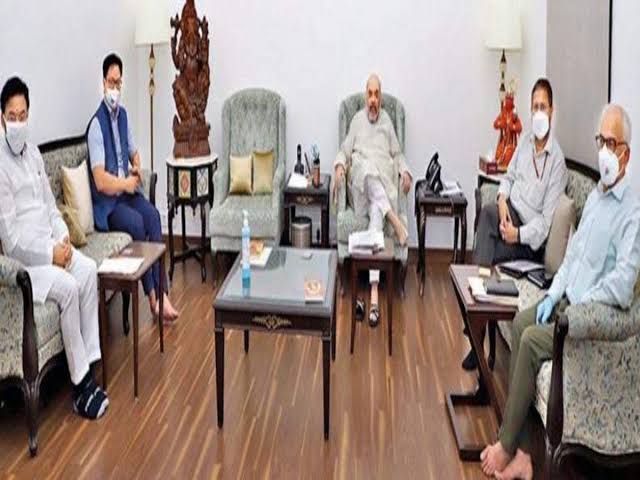NEW DELHI: A key outfit from Ladakh on Sunday revoked its call for boycott of the elections to Ladakh Autonomous Hill Development Council (LAHDC) in Leh and extended support for their smooth conduct, in view of the Centre’s assurance that all issues related to protection of language, demography, ethnicity, land and jobs of the people of Ladakh shall be positively considered.
The assurance was given by Home Minister Amit Shah
to a delegation of the ‘People’s Movement for Constitutional Safeguard Under Sixth Schedule for Ladakh’ —comprising Ladakhi veterans like former Rajya Sabha MP Thiksay Rinpoche, former Lok Sabha
MP Thupstan Chhewang and former J&K minister Chhering Dorje
— at a meeting held at his residence on Saturday. The meeting was attended by youth affairs minister Kiren Rijiju and junior minister for home G Kishan Reddy.
As per the agreement reached, a dialogue between a larger Ladakhi delegation comprising representatives from both Leh and Kargil districts and the Union Home Ministry
would begin 15 days of culmination of the LAHDC, Leh poll due in mid-October. Reddy will also be travelling to Ladakh along with the delegation on Monday to allay the apprehensions of the people there.
Shah had on Saturday assured the delegation that the government of India is committed to empowering the LAHDC of Leh and Kargil and safeguarding the interests of people of the Union Territory. “The government is open to discussing protection available under the Sixth Schedule of the Constitution of India
while looking into issues related to Ladakhi people,” said a home ministry release issued on Sunday.
Rijiju said the Union home minister had said that the provisions in Sixth Schedule would be looked into and “beyond that whatever is possible for protection of people of Ladakh under provisions of the Constitution, will be considered”.
The people of Ladakh have been demanding protection under the Sixth Schedule — a Constitutional provision that secures rights of indigenous people in some tribal-dominated regions of the north-eastern states by imposing restrictions on acquiring and transfer of land rights.
Chhewang, who was part of the delegation that met the home minister, said the people of Ladakh, after the nullification of Article 370, have some apprehensions about their future, land, culture and jobs since there is no longer any legislative body there.
Stating that Ladakhis were opposed to a domicile law on the lines of J&K, Chhewang said the region, with 97% tribal population, needed protection for land, ethnicity, language, etc. “Whether we get this protection under Sixth Schedule or any other provision of the Constitution, we will get more protection than was offered to us under Article 370 and 35A,” he said.


